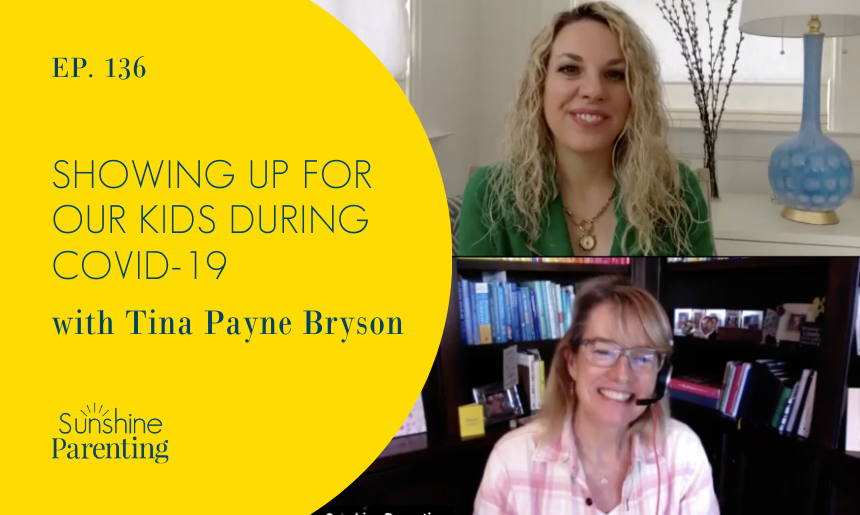
Download this episode.
Tina Payne Bryson, Ph.D. has encouraging advice to share during COVID-19. We talked in January (Ep. 121: The Power of Showing Up with Dr. Tina Payne Bryson) about her new book with Dr. Daniel Siegel, The Power of Showing Up, and the message of the book is so relevant to our intense time with our kids during this pandemic.
We chatted again last week (during Week 4 of “Iso for the Rona”) on a Facebook Live interview. This week’s podcast is the audio from that interview.
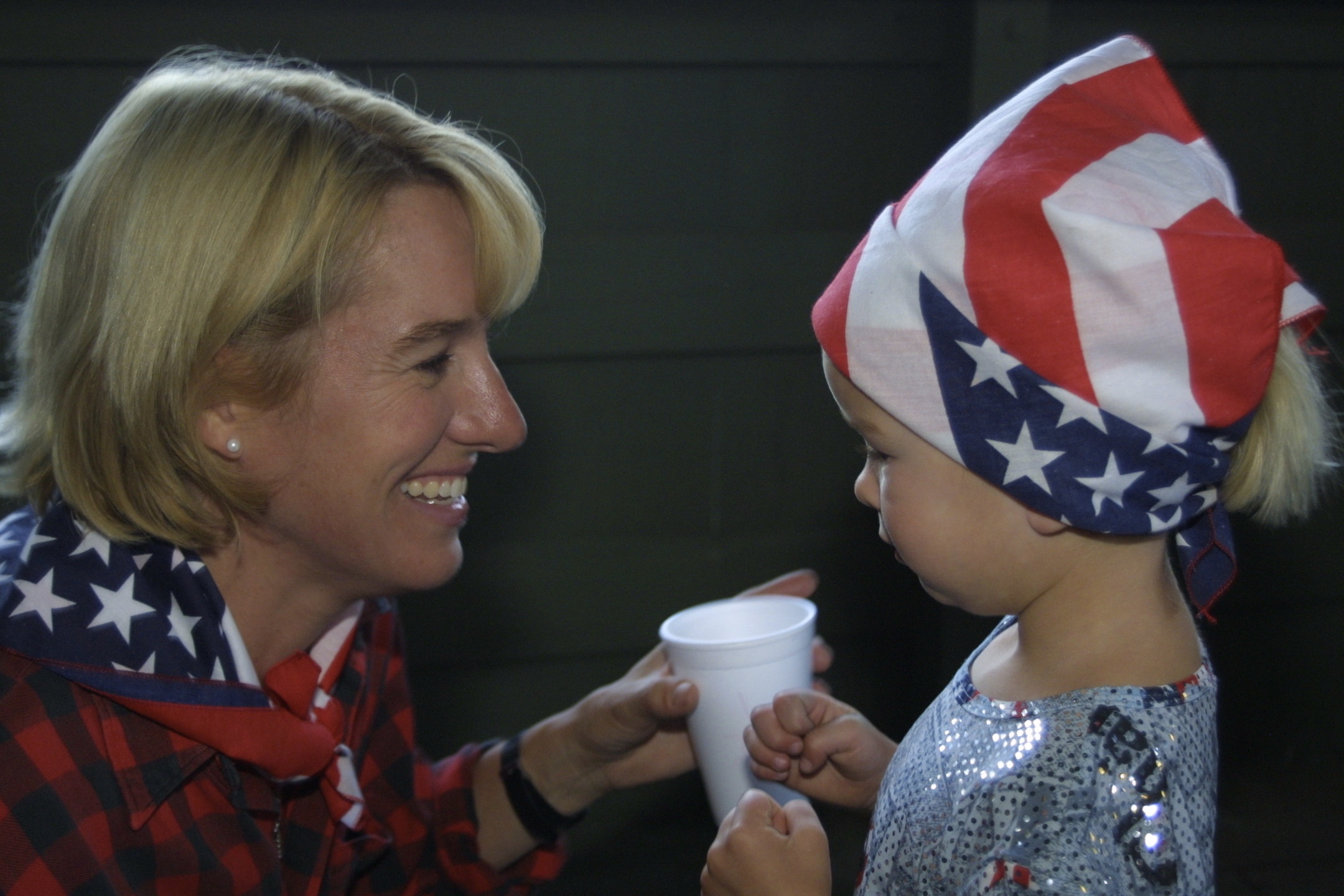
Big Ideas
- During hard times, it’s easy to focus on what’s going wrong instead of what’s going right.
- We all need to find ways to stay sane and grounded. Some ideas are: gratitude practices, physical exercise, being in nature, and finding ways to connect with your loved ones.
- Showing up and being present for your children is one of the best predictors for future success, as well as for overall health and wellbeing.
- The four S’s help to promote secure attachment, helping kids feel safe, seen, soothed, and secure.
- It is during insecure times like these that our biological attachment system compels us to connect with people in our lives who help us to feel safe, seen, soothed, and secure.
- Just being present for your child is enough.
- Parents need to work on their own emotional balance, resilience, insight, and empathy and that work will carry over and strengthen their relationships.
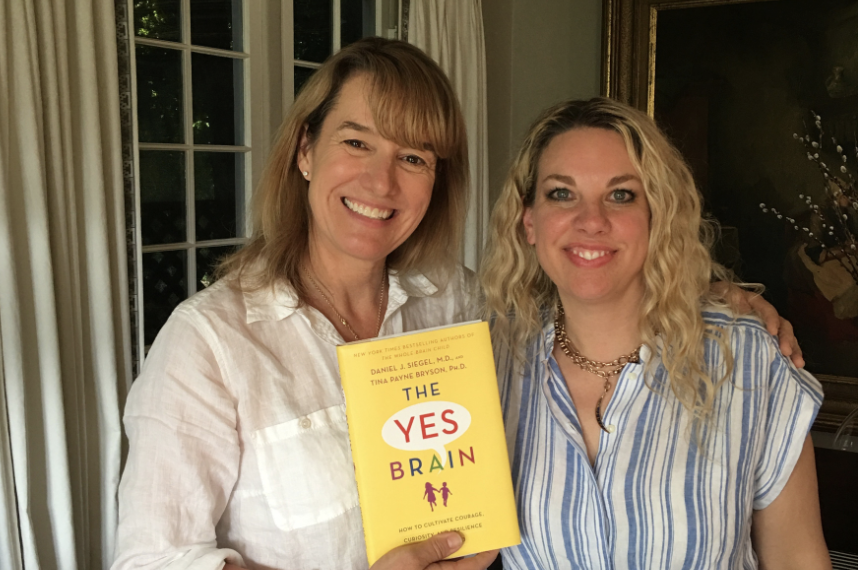
Audrey & Tina
Ep. 95: Raising a Yes Brain Child with Tina Payne Bryson
Quotes
Tina: “I love my work, but I love being at home. So I’m really cherishing this time and I go a little stir crazy at times.”
Tina: “I felt like I was going to go crazy yesterday for a little while and I just went outside without even a purpose. I just went and followed my dog’s lead, outside in the fresh air.”
Audrey: “Parents are being inundated with so much right now, it can be overwhelming.”
Audrey: “Isn’t it fortuitous that the Power of Showing Up just came out?”
Tina: “The message of the book is even more germane now. The idea in the book is based on 50 years of attachment research that says one of the best predictors for how well kids turn out is that they have someone who shows up for them, or what’s called a secure attachment.”
Tina: “The whole purpose of the attachment system in mammals is that during distress, fear, terror, and danger, that’s when our attachment system is activated. That’s when we have the biological drive to go to someone who will help give us the 4 S’s.”
Tina: “It is our attachment system that sets us up to be resilient in the face of exactly this type of thing.”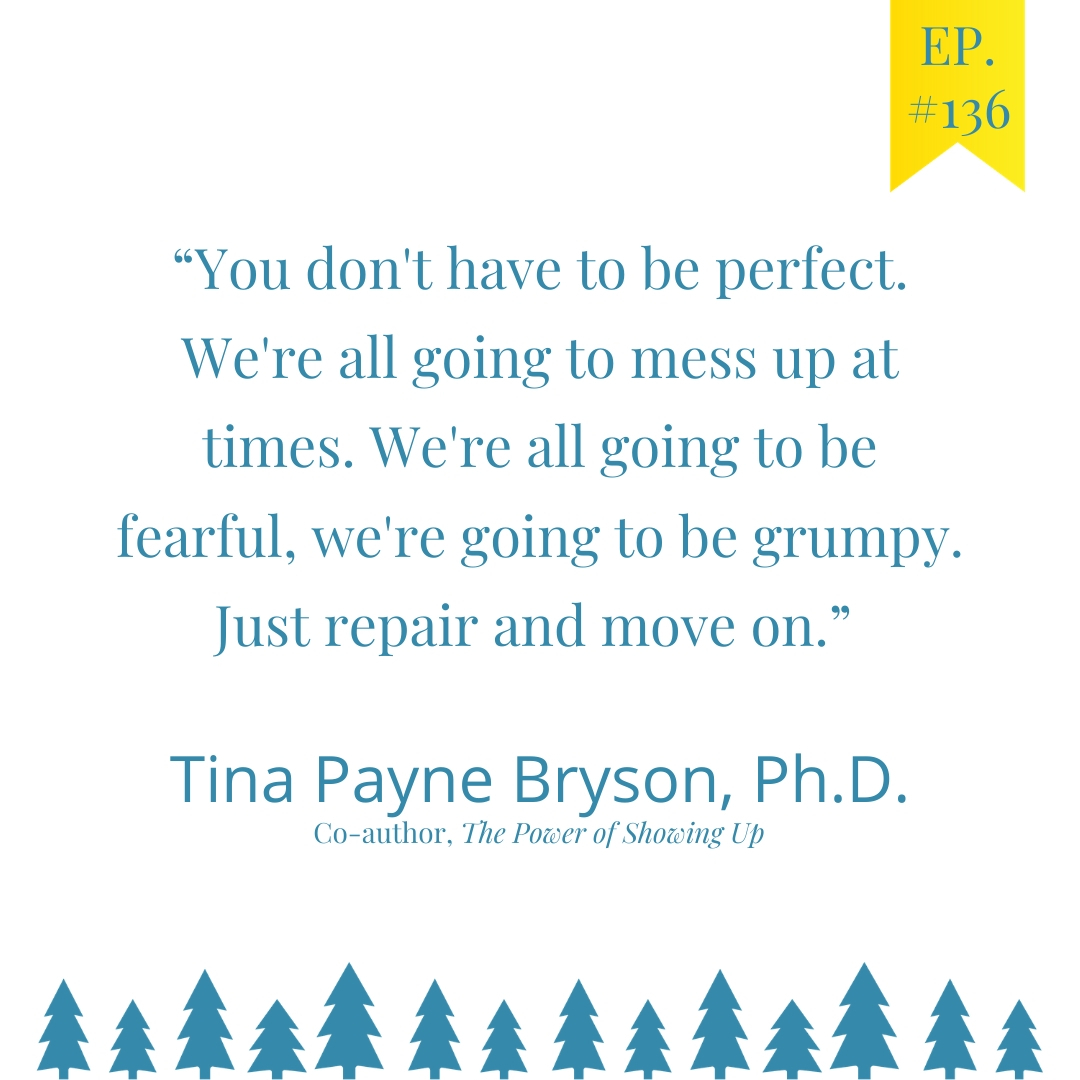
Tina: “One of the main messages I want to give teachers and parents is, first of all, you don’t have to be perfect. We’re all going to mess up at times. We’re all going to be fearful, we’re going to be grumpy. Just repair and move on.”
Tina: “Just by you walking through this with your child, even in imperfect ways, you’re doing it. What your kids need most from you is YOU.”
Tina: “I’m going to focus on helping my kids feel safe, seen and soothed and just being present to them. And that’s all I need to be doing. That’s more than good enough parenting.”
Audrey: “I think that it’s an important thing for people to understand that we are all people with our own feelings going on, though this and every other time, and you give the guidance of what we need to do for ourselves, too.”
Tina: “We all need people who help us feel safe, seen, soothed and secure. That’s a message that’s really important to tell parents.”
Tina: “We sacrifice so much for our kids and that mammalian need to be connected and have people show up to us, is not just for our kids, it’s for us, too.”
Audrey: “There are simple things we can do just to let our kids know that, ‘we’re here with you and we’re going to be okay.'”
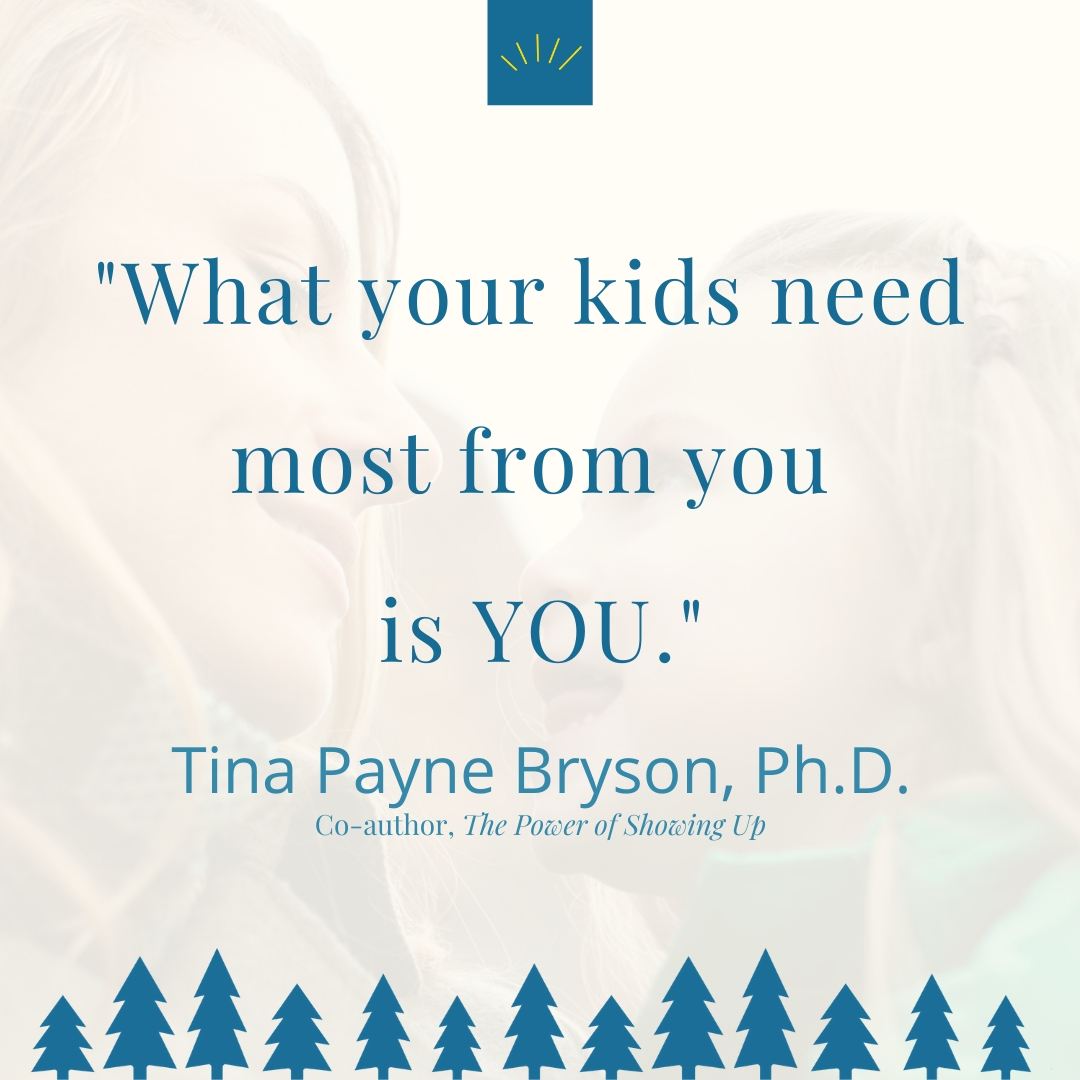
Tina: “When your kid is complaining, it activates a fear or threat response and it’s really annoying but if we can really just be present to our child’s experience and say, ‘it’s frustrating, isn’t it? It’s not like it used to be. It’s such a bummer we have to do this right now, isn’t it?’ Just keep it simple.”
Tina: “But if we respond to our children’s complaining with argument or criticism, and say, ‘you should be grateful.’ we are actually criticizing them for sharing what they’re feeling. So our kids will make that association…and stop sharing how they feel.”
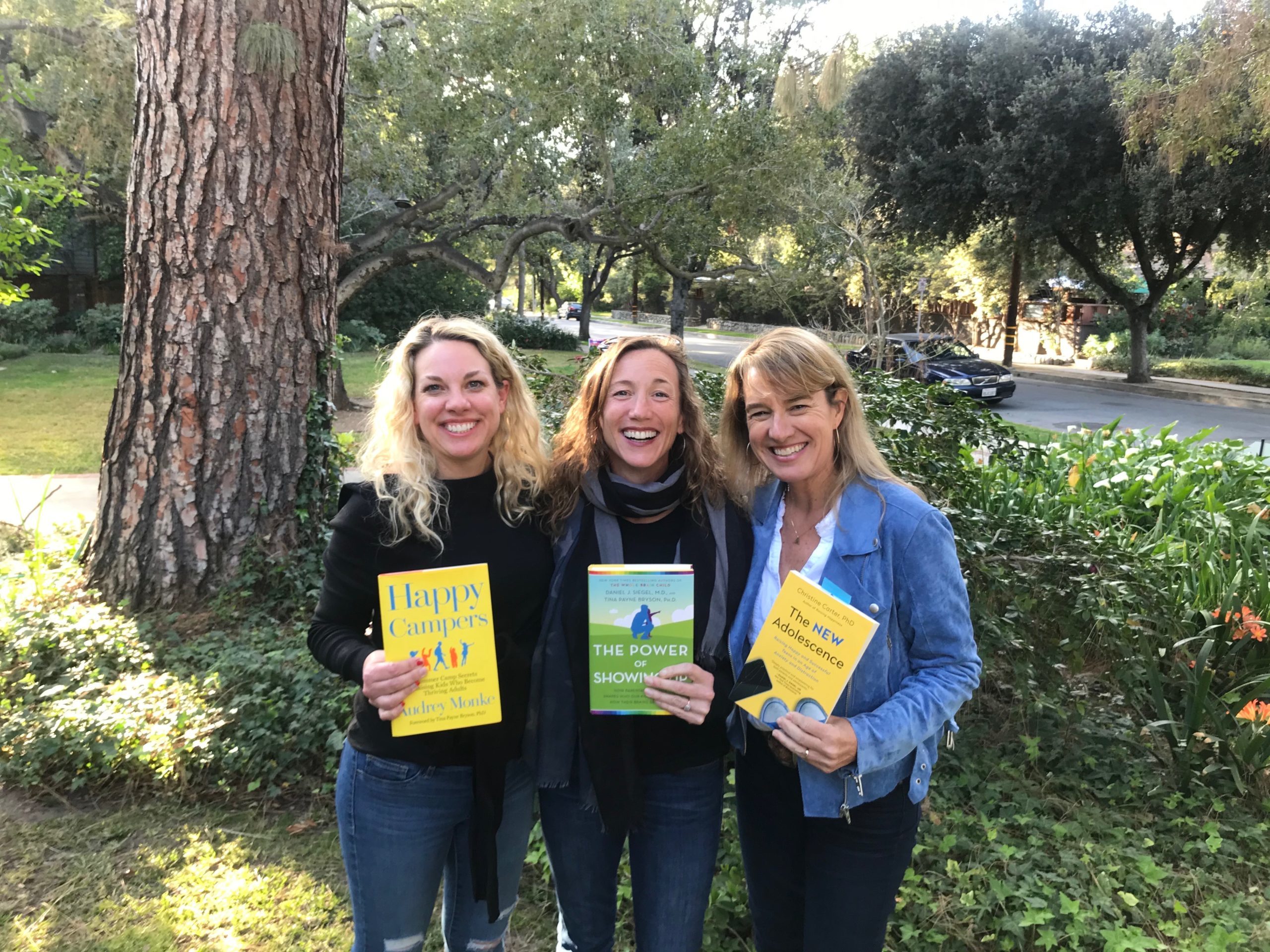
Tina, Christine Carter, Ph.D., and Audrey with each other’s books: Happy Campers, The Power of Showing Up, and The New Adolescence. March, 2020
Watch Tina’s Video Messages for Teachers & Parents During COVID-19
A Message for Parents from Tina Payne Bryson, PhD on Vimeo.
https://vimeo.com/399730541
2 Things that Increase Chronic Stress & 2 Things that Reduce it in Our Kids from Tina Payne Bryson, PhD on Vimeo.
https://vimeo.com/402633303
Fear Messaging vs. Safety Messaging from Tina Payne Bryson, PhD on Vimeo.
https://vimeo.com/402467778
Access Tina’s Resources for Coping with the Coronavirus
Watch Tina & Audrey’s chat on video
One Simple Thing
This week’s one simple thing tip is to create a gratitude wall or board using sticky notes. Each family member can have their own “color” sticky note, and you can each put up at least one sticky note per day with something you’re grateful for.
More gratitude resources:
Flourish: A Visionary Understanding of Happiness & Wellbeing, Dr. Martin Seligman
A Grateful Family is a Happy Family: 5 Gratitude Practices
Ep. 63: Growing Gratitude with Sara Kuljis
Ep. 114: Precursors to Gratitude
Raising Grateful, Not Entitled, Kids
My Favorite
I love all of the Soul Pancake videos, which also include the fun Kid President series. If you need some inspiration, check out Soul Pancake’s YouTube channel.
Listener Question
How should I respond when my child is complaining about unimportant, seemingly selfish things during this pandemic?
Validate their feelings! I made a short video about the importance of validating and not dismissing our kids’ feelings:
Related
Ep. 121: The Power of Showing Up with Dr. Tina Payne Bryson
Ep. 95: Raising a Yes Brain Child with Tina Payne Bryson
Happy Campers: 9 Summer Camp Secrets for Raising Kids Who Become Thriving Adults (Foreword by Tina Payne Bryson, Ph.D.)

